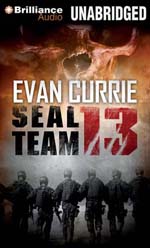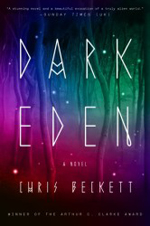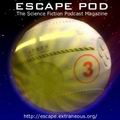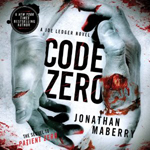
 Seal Team 13
Seal Team 13
By Evan Currie, Read by Todd Haberkorn
Publisher: Brilliance Audio
Publication date: 15 November 2013
[UNABRIDGED] – 9 hours
Themes: / military sci-fi / Navy SEAL / supernatural / horror /
Publisher summary:
It’s been ten years since a mysterious, horrific incident in the South China Sea annihilated a US Navy destroyer and its Navy SEAL team. Only one man survived. Now, the US Navy is determined to put a stop to the new, frightening incidents taking place with alarming frequency. Enter SEAL Team 13, an elite group of soldiers led by sole survivor Harold “Hawk” Masters. Everyone on the team has survived contact with supernatural forces from “the other side.” Will their camaraderie and duty to country be enough to defeat the malevolent undead forces threatening the country? From world-building author Evan Currie, SEAL Team 13 is a dark, riveting, and action-packed tale of military intrigue and supernatural horror.
I hadn’t heard much about this one, but the description convinced me to give it a go. A military group is assembled to take on supernatural occurrences and with my experience with Myke Cole’s Shadow Ops series, which is really only similar in the fact that the military is involved, I thought I couldn’t miss.
Sadly, what started out as a fun romp with the military and monsters turned out to be a cliched and underwhelming frustration.
The Cliches
I don’t outright hate cliches. I think they can be used well and it’s an easy way to get people into the story or characters without having to waste time (i.e. pages) explaining things. The problem I had here was that once you make reference to “it’s like I’m in a movie” one too many times, it starts to pull you out of the immediate story. It’s no longer its own story, it’s someone else’s. And it just plain started to bug me since just about every character had to make mention of being in a bad horror movie.
And I was even impressed that the cliches weren’t so much in the monsters themselves. Obviously there were some monster cliches, but I liked the idea behind the vampires/zombies. Sadly it wasn’t enough.
Why I Was Underwhelmed
One of the big promises I felt that were made early on was that this team was collected to take on the supernatural occurrences in the world. Occurrences is plural right? So, I figured we would get more than one.
Okay, technically there are more than one because of the backstory of the characters, but the team itself only ever takes on one ridiculously long occurrence of the supernatural and that’s the end of this rather short book. Just a couple more would have made this so much better. Let’s see what else they can do. Are they really here for just the one event? It makes the whole idea behind supernatural threats seem much less … erm … threatening.
Longest Drawn Out Fight Scene Ever
This was the kicker. The last bit of the story has these guys throwing just about everything at the “boss” bad guy monster thing. They chase her through the building, then down the road, and it’s always just in the nick of time that she gets away/protagonist gets saved. And then it happens again … and again. I was so done with this scene. There’s tension and then there’s a time when you’ve built up the tension so much it breaks. When nothing has actually occurred in terms of resolution, I just can’t care anymore.
The Narrator
The narrator, Todd Haberkorn, did a good job. He definitely matched the cliches well and did solid work. I can’t say he was my favorite ever, but that may have been the lines he was given to work with as well. It’s hard to say.
Posted by Bryce L.
 Dark Eden (Dark Eden #1)
Dark Eden (Dark Eden #1)

 Escape Pod #429 Little Black Bag
Escape Pod #429 Little Black Bag Code Zero (Joe Ledger #6)
Code Zero (Joe Ledger #6)